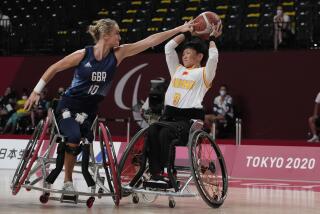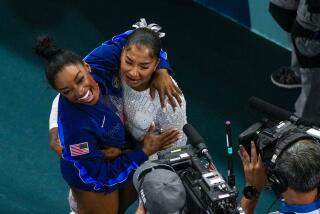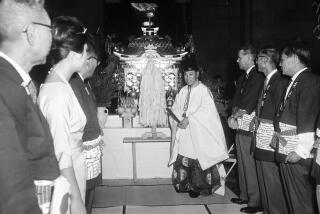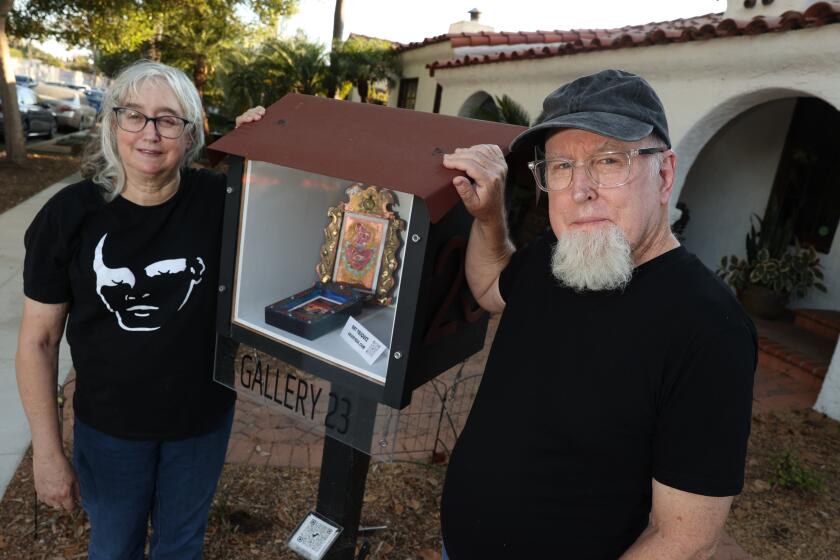Cultural Olympiad hits stride as London Summer Olympics near
LONDON — Every street, alley and grassy knoll here will be alive with a cacophony of ringing bells — church bells, bike bells, doorbells and a ringing-bell app downloaded to smartphones. Or at least that’s the plan behind “All the Bells: Work No. 1197,” a massive interactive performance art project created by artist Martin Creed to mark the start of the London Olympic Games on July 27.
“All the Bells” is one of 12,000 cultural events unfurled across Britain to celebrate the Games. The Cultural Olympiad officially launched in 2008, but activity has reached a frenzy as towns across the land mount performances and artistic spectacles. The events include a life-sized inflatable moon-bounce version of Stonehenge created by artist Jeremy Deller that is popping up all around the country and Peace Camp, an exploration of love poetry by theater director Deborah Warner and actress Fiona Shaw designed to be experienced at remote beach locations.
The bulk of performances and exhibitions have landed in London, including a Pina Bausch retrospective, the World Shakespeare Festival, the premiere of ex-Blur singer Damon Albarn’s folk opera “Dr Dee” and major exhibitions of Damien Hirst, Yoko Ono, David Hockney and Lucian Freud. Always one of the great cultural cities of the world, London is like an overstuffed cabinet of wonders this summer, with more attractions than any one person could possibly attend — even the director of the Cultural Olympiad, Ruth Mackenzie.
PHOTOS: London’s Cultural Olympiad
Described by the Guardian as “the cavalry,” Mackenzie was drafted into the job in 2010 with a mission of bringing focus to an unruly mass of events. “The good thing about coming in with two years to go is that expectations are quite low about what you can achieve,” Mackenzie said last month, drinking tea in a museum cafe high above Trafalgar Square. A former head of the Scottish Opera and the Manchester International Festival, she has cropped silvery hair and a surprisingly mischievous air for someone controlling a huge arts festival.
FOR THE RECORD:
Cultural Olympiad: An article in the Arts & Books section elsewhere in this edition about the Cultural Olympiad said that spending for the celebration and the London 2012 Festival is estimated at 100 million pounds, or $136 million. The correct dollar conversion figure is about $155 million. The error was discovered after the section was printed. —
Mackenzie saw the Olympiad as a chance to stage some extraordinary performances in a moment of global belt-tightening. (She estimates the spending for the Cultural Olympiad and the London 2012 Festival at around 100 million pounds, or $136 million.)
“What can you do creatively that is once in a lifetime? I think Gustavo Dudamel and Simon Bolivar turning up in Raploch is once in a lifetime,” she says, referring to a June concert in a small Scottish town in which Dudamel conducted a symphony made up of local children and the Simon Bolivar Youth Orchestra of Venezuela. Another favorite example is “One Extraordinary Day,” featuring Elizabeth Streb and her daredevil Brooklyn dance troupe scaling an undisclosed London landmark.
Arts festivals have been a component of the Olympics since the ancient Greeks, but there are surprisingly divergent views about how to stage these events and how integral they are to the experience. The Los Angeles Olympics Arts Festival in 1984, for example, had a catalyzing effect on the city, according to theater director Peter Sellars.
“It woke people up to L.A. as a cultural site and we were able to follow through on that in the ‘90s and explore the city as a cultural destination,” said Sellars, who was director of the 1990 and 1993 Los Angeles Festivals, arts extravaganzas inspired by the ’84 Games. “The L.A. Olympics festival redrew people’s internal maps,” yanking Angelenos out of their insular neighborhoods and giving local artists global connections, he said. “And it will almost certainly do that for London too.”
Beatriz Garcia, head of research at Liverpool’s Institute of Cultural Capital and author of “The Olympic Games and Cultural Policy,” said Olympics arts festivals “are the one aspect of the Games that offers greatest flexibility to include and represent diverse communities and their voices, as well as highlight the best art and cultural offerings available, which in turn may lead to long-term economic returns such as increased tourism.”
In fact, Mackenzie said she’s been asked to hit a target: “This is the sixth most-visited country in the world, and Jeremy Hunt [secretary of state for culture, Olympics, media and sport] wants us to be the fifth most-visited country in the next 10 years” and surpass Italy. She added with a chuckle, “I won’t be in the job in 10 years, so I’m not sure how he’ll hold me to account.”
Balancing the needs of ministers and the interests of residents is tricky, particularly for a nation in economic distress, and there’s been grumbling among the British about the cost of these arts events.
“The contrast between money being spent on all the Olympics’ pageantry and the significant cuts in benefits casts the Olympics in a different light than when the Games were confirmed in 2005, which was a time of relative prosperity,” said British journalist Dorian Lynskey, author of “33 Revolutions Per Minute: A History of Protest Songs.”
Lynskey doesn’t see a coherent sense of contemporary British culture in the arts festivities — and little trace of Tony Blair’s triumphal “Cool Britannia” of the ‘90s, when Britpop bands Blur and Oasis spearheaded a mini-British invasion of the U.S. and cheeky artists like Hirst and Tracey Emin were proudly dubbed YBAs (Young British Artists). “In the mid-’90s, it was easy to present an upbeat narrative,” he said. “Against the current backdrop of ongoing political and economic crisis across Europe, there’s not the feeling this is a golden era.”
PHOTOS: London’s Cultural Olympiad
He points out that the decision to have 1980s and ‘90s bands like Blur, New Order and the Specials perform at the Olympics’ closing concert rather than a contemporary black British rap star like Dizzee Rascal suggests a need to stoke nostalgia rather than celebrate 2012 urban diversity. “Are we celebrating Britain now or 15 years ago?”
Sellars believes that the emphasis on international collaboration rather than a narrow focus on “best of British” is in step with the times. “We’re going way past the world of flags,” he said. His own contribution to the Cultural Olympiad, “Desdemona,” brings together American novelist Toni Morrison and Malian singer Rokia Traore in a reimagining of Shakespeare’s Desdemona and her African nurse.
Although a great number of the arts events are international in scope, the festivals also feature events designed specifically for local communities. Among them is Frieze Projects East, art installations scattered through unglamorous East London neighborhoods.
Matthew Slotover, founder of Frieze magazine and co-director of the Frieze Art Fair, said, “People who live in East London have the Olympics coming to them. They will get construction and disturbance — but they won’t necessarily get tickets. So our remit was to look at those boroughs and work with artists who have a connection to East London.” One sculpture — Gary Webb’s brightly colored work, which can also be used as a jungle gym — will remain as a permanent fixture in a Greenwich park. Slotover says other councils have expressed interest in using it as a model for the future public art projects.
Most of the Cultural Olympiad’s events will be more ephemeral, however. Is this all just a gluttonous feast, forgotten as soon as it is digested?
Nicholas Kenyon, director of the Barbican Centre — host to “Desdemona” and the Bausch retrospective, among many others — believes there’s an important afterlife. “When London was thriving, everyone was doing stuff and being rather competitive about it,” he said. “The Olympics has forced us to face in the same direction. It has been unprecedented to get the Arts Council, the Greater London Council, the BBC, the Tate, the British Museum ... all to work together.”
Mackenzie hopes to leave behind “an audience legacy as well as an artistic legacy.” She points to the Globe festival this spring, which presented 37 Shakespeare productions by companies from 37 countries. Of the 100,000 people who attended, she says 80,000 were first-timers.
“We’re introducing people to very serious art. That’s why we wanted to create 10 million free tickets or opportunities [to attend events]. It’s much easier to say, ‘Come see Tino Sehgal, I promise he’s a genius,’ if it’s free,” she said, referring to the British-German performance-installation artist who will unveil his mysterious commission at the Tate Modern museum’s grand Turbine Hall on July 24.
A number of Olympiad events rely on unpredictability — like Creed’s mass bell-ringing or “Troilus and Cressida,” a long-distance collaboration between New York’s Wooster Group and Royal Shakespeare Company in which the very different troupes won’t rehearse together until close to the premiere.
“There will be some things that just don’t work,” Mackenzie conceded. “You remember Sam Beckett’s great saying, ‘Fail again. Fail better’? If you’ve done your job well in taking risks, then there will be some risks that don’t come off. That is the same as the Olympic Games — more people don’t win medals than do.”
Additional reporting by Danielle Paquette.
More to Read
The biggest entertainment stories
Get our big stories about Hollywood, film, television, music, arts, culture and more right in your inbox as soon as they publish.
You may occasionally receive promotional content from the Los Angeles Times.











